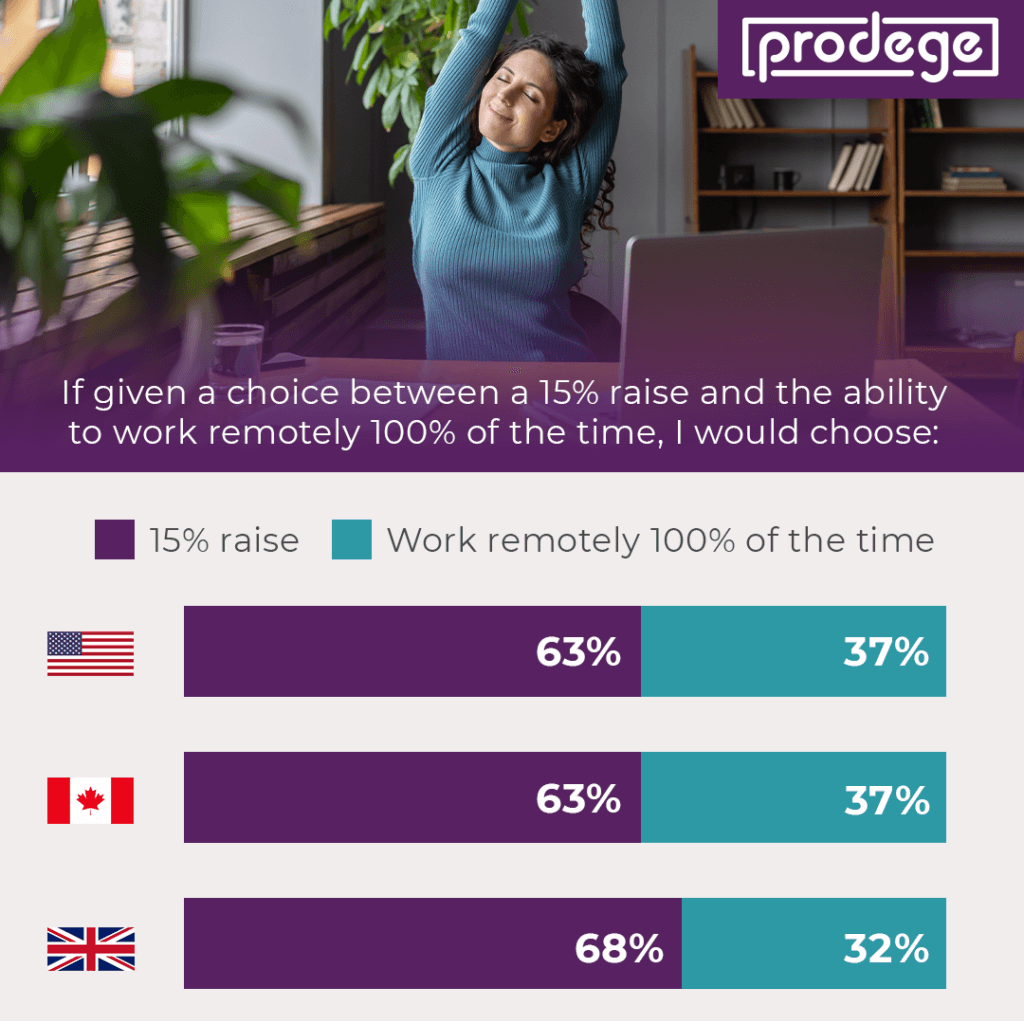More than two years from the point when remote work trends were all the rage in many industries, we surveyed over 1,000 workers in each of three key countries (US, Canada and the UK) to get a fresh perspective on where they prefer to take care of business.
What Motivates More: Bigger Paychecks or the Ability to WFH?
When thinking about their current job, the majority in each country (59-63%) would choose a 10% raise over the ability to work remotely 50% of the time. When picking between a 15% raise and the ability to WFH 100% of the time, 68% in the UK and 63% in the US & Canada would opt for the higher payday.

“Show Me the Money…and Also Give Me More Autonomy”
Over eight-in-ten in the US, UK & Canada strongly/somewhat agree that due to inflation, companies should be giving proper raises to all employees (84-86%). Also, despite the data in the above section, at least three-in-four concur that commuting to work takes time that could be better spent getting work done at home (76-78%).

Remote Work Trends Better When it Comes to Productivity
Less than four-in-ten in each country agree that the most productive work is done in an office (35-38%). Additionally, the majority feel that if companies are requiring lower-level workers to come into the office, upper management should also have similar attendance requirements (79-82%).

Do Office Perks Make a Difference?
Employees want their companies to offer bells & whistles to make going into the office more appealing (57%-67%), especially those 40 & under (66-73%). Top perks viewed as enticing regardless of age, are flexible hours/the ability to come into the office for a partial day, reimbursement for commuting costs, free lunches and/or fully stocked kitchens. Additionally, Gen Z & Millennial workers (aged 40 & younger) tend to express more interest in the office offering day care stipends, on-site babysitting services and/or an on-site gym.
Are the Younger Generations Leading the Charge in Asking for Workplace Flexibility?
The majority in each country feel companies should give employees the option to work fully remote (64% in the US, 65% in the UK, 73% in Canada) as well as allow employees to decide how often they go into the office (59% in the US, 68% in Canada, 69% in the UK), with Gen Z & Millennials most avid in both regards.

Looking to get a consumer pulse on trending topics or key brand metrics? We have a proven track record of connecting our partners to the right audiences, providing 24/7 support & quick turnaround and offering flexibility to develop a plan tailored to specific requirements. Reach out to get your next project underway!

Bess Devenow
Share This Article
Recent Press Releases
Upromise Extends a Helping Hand to Student Loan BorrowersWith 68% of borrowers making financial sacrifices to repay their student loans, Upromise now offers [...]
71% of Self-identified Snorers Have Never Consulted a Healthcare ProfessionalNational survey identifies major obstacles to treating snoring and sleep issues June 28, 2023 08 [...]
Prodege’s 2023 Summer Survey: 55% of Americans Plan to Travel This Summer45% will travel more than last summer. 73% plan to drive with 36% planning to fly to their summ [...]









